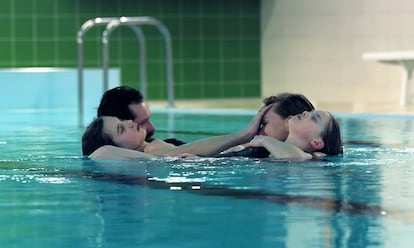Contemporary societies have become so complex, strange and indecipherable that a time has come when certain films that seek to be futuristic dystopias are practically indistinguishable from current reality. Or, in an almost more disturbing way, the case of works that, showing reliable events and proven facts, are so inconceivable that they can only be inferred as an abravative futuristic situations away from ideal.
This second case is that of the Greek film set in Sweden Pause life, With which, unless the spectator has grabbed certain marginal news of the International Media section in recent years, only the country fits. The terrifying stupefaction of the baptized as a resignation syndrome, which has only been given in Sweden and in children of refugee families from countries belonging to the ancient USSR and Yugoslavia, who have been denied asylum, and that afflicts them just after they are informed that they will be deported. A condition that makes them fall into a kind of comma with the upper brain functions detained.
Described by some as an “epidemic hysteria”, for others as a “cultural psychogenesis”, and also by a third group of skeptics as a sample of Munchausen syndrome (creation of ailments to end up assuming the role of patient), this species of catatonia has not been punctual or sporadic. It has been given in hundreds of kids and adolescents (thousands, according to some sources) since 1998, although it was only released from 2017. Now, how to tell this in a film? If you see Pause life Without too much or any information, the impression that causes is what would produce a hypothetical episode of Black Mirror Directed by Yorgos Lanthimos. In fact, even if it develops in the Scandinavian country with some renowned Swedish interpreters, the production is mostly Greek, and its director, Alexandros Avranas, specialized in sordidal issues and treatments in their four previous films (one of them, in the United States), looks like an anmation of the author of the author of Canino, Alps y Poor creatures.
Composed around fixed plans elongated in time already cold symmetries, with hardly any background music, with distanced interpretations and a cold photograph of gray and blue turns off, Pause life It is rough, complex and, above all, in the final stretch, it has a tone tending to the absurd that can be rejected by the viewer. However, with such a rugged issue, so convoluted that it has even become a demolition political material and, as almost everything today, as a sign of ideology from one side or another around refugees, another part of the audience will convince them the peculiar vision of Avranas. Far from a certain European social cinema aimed at maniqueo and much closer to a cruel satire of political court.
An ambiguous vision that, instead of embrapping the reasons and pain of the families of applicants, or the inclement response of the Swedish institutions, decides to sink them all. Like Anthony Burgess and Stanley Kubrick in Mechanical orange, That dystopia that left you Baldado with the unbearable violence of Beethoven’s lovers, and also with the ruthless ludovic method imposed by the authorities.
Pause life
Address: Alexandros Avranas.
Interpreters: Grigoriy dobrygin, chulpan khamatova, Lena endre, Lisa loven.
Gender: drama. Grecia, 2024.
Duración: 99 minutes.
Premiere: April 4.

